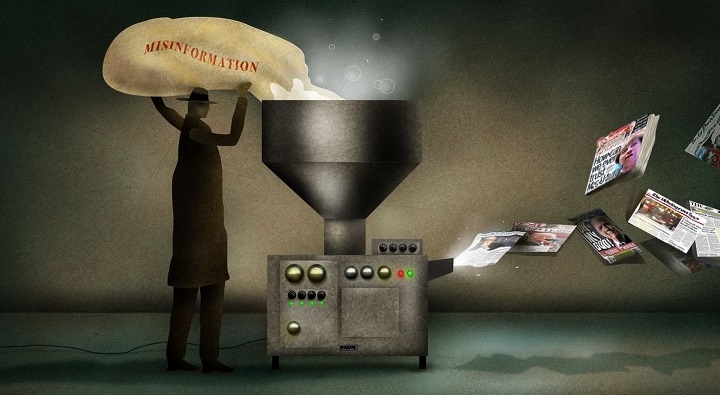
Internet platforms that distribute unequivocally both solid and fake news, gain credibility with solid news and make money with fake news, driving away resources necessary to produce solid news. Yet solid news is necessary ground for sound decisions and opinions contributing to choices of government. The situation has to be redressed or the basis of democracy will be ruined and this will usher an Orwellian tyranny of distorted reality – plus the nationalization of internet platforms
The issue of fake news is as old as philosophy. Greek thinkers like Plato objected to wordplay by the Sophists, what we would label as old-time bad lawyers who passed on the term sophistries. Chinese ancient philosophy also objected to the badinage of Mingjia, the school of names, which notoriously tried to argue that a white horse is a not a horse: bai ma fei ma ye 白马非马也.[1]
However, modern fake news is objectively on a very different scale and creates a whole different environment and economy. Large portals like Twitter or Facebook and gargantuan search engines like Google or Bing, slap together good philosophy and sophistries in a careless mishmash—or if we want to put it in economic terms, good money and bad money, all in the same circulation. This is something that all students of economics know fundamentally disrupts the economic order, as bad money drives out good money. In this case, fake news drives out good news. This is not just theory; it is everyday practice.
One can see the difference in the number of hits received by a sensational yet meaningless report like a cat born with three heads compared to the hits of a long analytical story published by, say, The New York Review of Books or The London Review of Books. Of course, these differences always existed, and idle gossip has always had greater currency than controversial debates on philosophy. But the two, gossip and philosophy, didn’t coexist in the same market. There were two “channels of distribution” of these two types of stories. Conversely, because it is convenient and easy, now high-brow publications can distribute their essays on the same platforms where a kid makes up his latest chat.
This creates better, more efficient tools for distribution of serious issues, but being together on the same platform, the existence of a New Yorker essay lends some credit to a tool, say Facebook, originally conceived just to exchange banter. Then the platform is no longer a toy; it provides de facto a public service, like water or electricity.
However, as the most hits and credibility are lent to the weirdest stories around, there is a short-circuit. There is no platform for distribution that separately provides for sound readership, and another that provides for bad readership. They are all at the same level, although they are not the same. It’s hard to tell which is which, and bad/fake news contaminates good/true news. The damage for good information and thus to democracy is structural. And the issue is money.
Good journalism needs great culture. Years of experience and very sound, ethical standards make it possible to tell true information from the false information people are fed every day. That is, good journalism is based on journalists who have to work ten to 20 years and after decades of study produce valuable stories.
Sensational gossip needs no study and certainly no ethical standards. Yet, based on the number of hits the two get, the one which needs huge capital investment, good journalism, receives a fraction of what it needs. Almost zero capital investment is needed for bad gossip. The playing field is horribly skewed toward bad information. Hits mean advertisements, and certain information gains a readership.
The reality is clear: fewer people read physical newspapers, and more people read information from the internet because it is far more convenient. But the price of unchecked convenience is that one can often hardly tell what’s of value and what’s of no value. This has turned into draining resources from good journalism and giving those resources to bad information, with an overall decline in the level of information.
A cure worse than the disease
Authoritarian regimes can address this issue by forbidding bad news; however, this remedy can be worse than the disease as once the authority to establish good news is given to a government, this government may abuse it or use it just to bolster its claim to power. Definitely, if governments hold on to the power to tell fake news from good news, then the media cannot work as the watchdogs of power as they are supposed to be.
Yet, in democracies, the lack of any control on the market on information de facto, day by day in an incremental surge, takes the power of information away from those with ethical standards and culture, and gives it to unethical word-mongers, just by increasingly depriving solid journalism of resources and giving them to bad “journalists”.
The objective responsibilities of large platforms, indifferent to whatever content is provided, are enormous. The trend, if not checked, will kill democracy as we know it, either by giving credence to the “just” intervention of the state in the management of news, or by giving credit to any unfounded conspiracy theory created by fake news. This is without even taking into consideration the possibility of malicious manipulation of news by rogue elements, such as criminals or hostile foreigners.
Yet, the problem perhaps should be addressed by a radical redistribution of resources provided by large platforms.
We do know that not all readers are the same.
The ones who buy The Economist or Financial Times or Osservatore Romano are for many reasons more important than those who just scroll through tweets. The advertising market does recognize these differences and prizes different readers accordingly. Perhaps something along these lines should also be established for large platforms. Valuable publications and important writers should be repaid in hits and advertising revenue distributed by large platforms very differently than to self-appointed opinion-makers.
That is, something in these platforms must be established drawing a difference between gossip and news, which are totally different products, although superficially they may look similar, just like good and bad money. That is, it’s impossible and unhealthy to try to abolish gossip, which has its own value, just like you want to use Monopoly money to play. But it is extremely important not to confuse it with news. This has to be done sooner rather than later, and has to be done based on different economic models.
When I started working as a journalist, a young man would not expect to become rich with this job, but he could hope for a reasonable, decent income that justified the long years of study and his fight against the omnipresent temptation of corruption. Now there are fewer jobs for journalists and lower pay. The result can only be that by and large journalists refuse to study, study less, or become more prone to all forms of corruption. Or that journalism becomes the preserve of missionaries, who sometime may become too radical, driven by their sense of mission, and thus lose balance.
Plus, readers cannot tell what is and is not journalism.
China is extremely sensitive to this issue. It is scared of the spread of fake news and thus it imposes state control on it, which can also work as a gateway against inconvenient truths. We may not like the Chinese solution, yet some of the problems that China raises are real. If democracies don’t address them, they will only lend new credit and justification to state control of news, rather than to the honesty, hard work, and study of the journalists.
The double circulation of good and bad money is unsustainable over a long time, and so is the double circulation of good and bad news—eventually the state will have to intervene and stop bad money/bad news from circulating.
If this happens by action of the state and not by a discrete action by the modern publishers (the platforms), this will destroy the platforms themselves, which will sooner or later be put under some form of state control. If the state doesn’t intervene, bad money/fake news may destroy the state.
If this happens, there will be no freedom anymore, and eventually the Googles and Facebooks of this world will be put under state control, just like Jack Ma’s Alibaba in China.
[1] http://www.settimananews.it/societa/the-satan-of-fake-news-and-the-devil-of-big-platforms/ or http://www.sisci.com/ReadNews.asp?NewsID=13903 https://www.limesonline.com/en/the-fake-problem-with-fake-news?refresh_ce






Most Dangerous are Fake Democracies. We all remember all that information about the Weapons of Mass Destruction of Saddam Hussein distributed by the governments of US and UK.